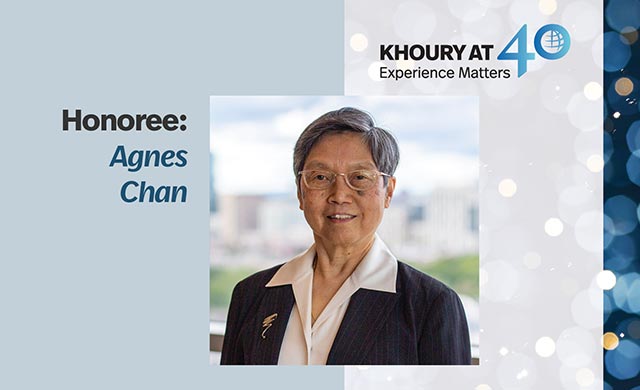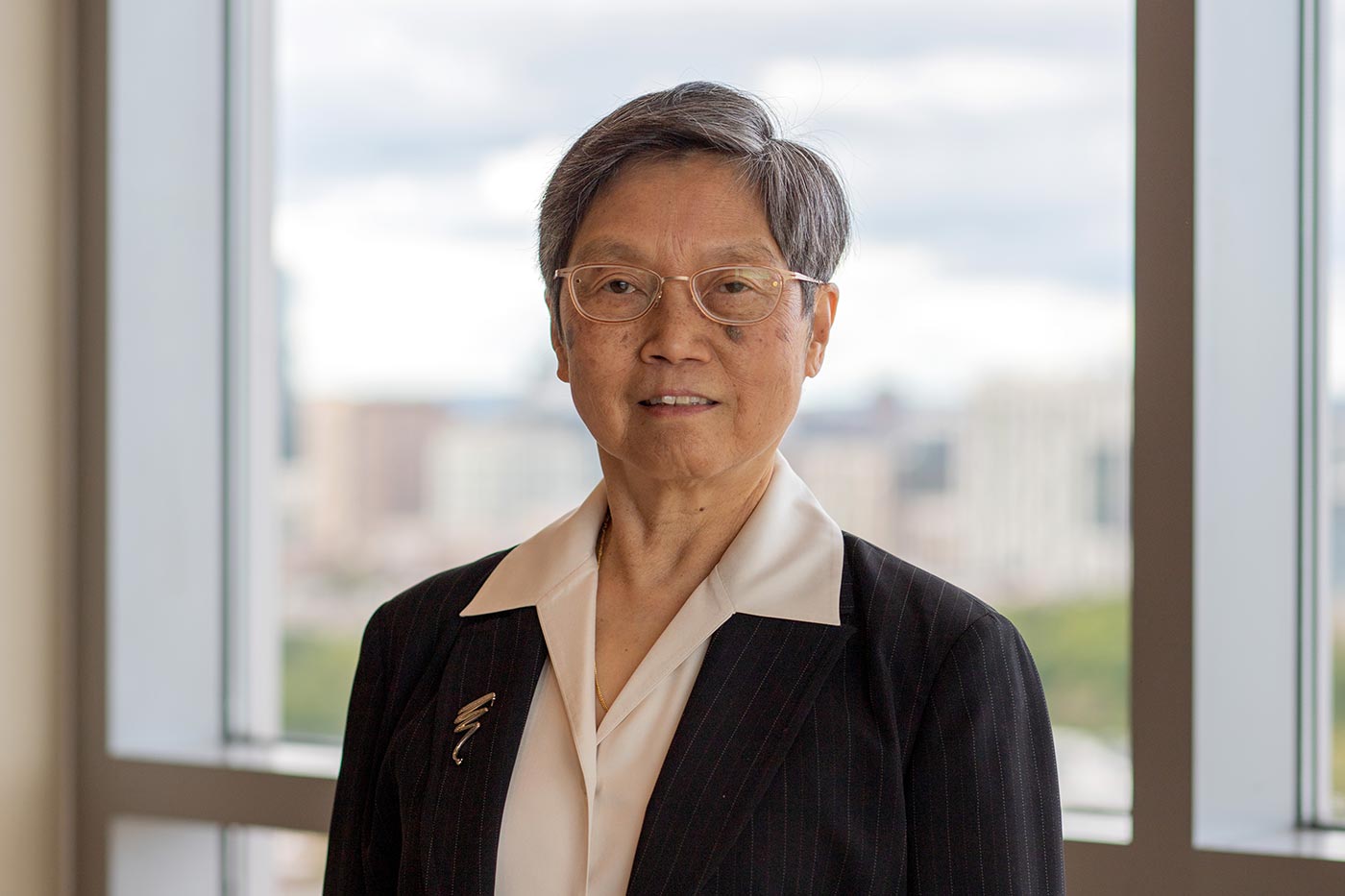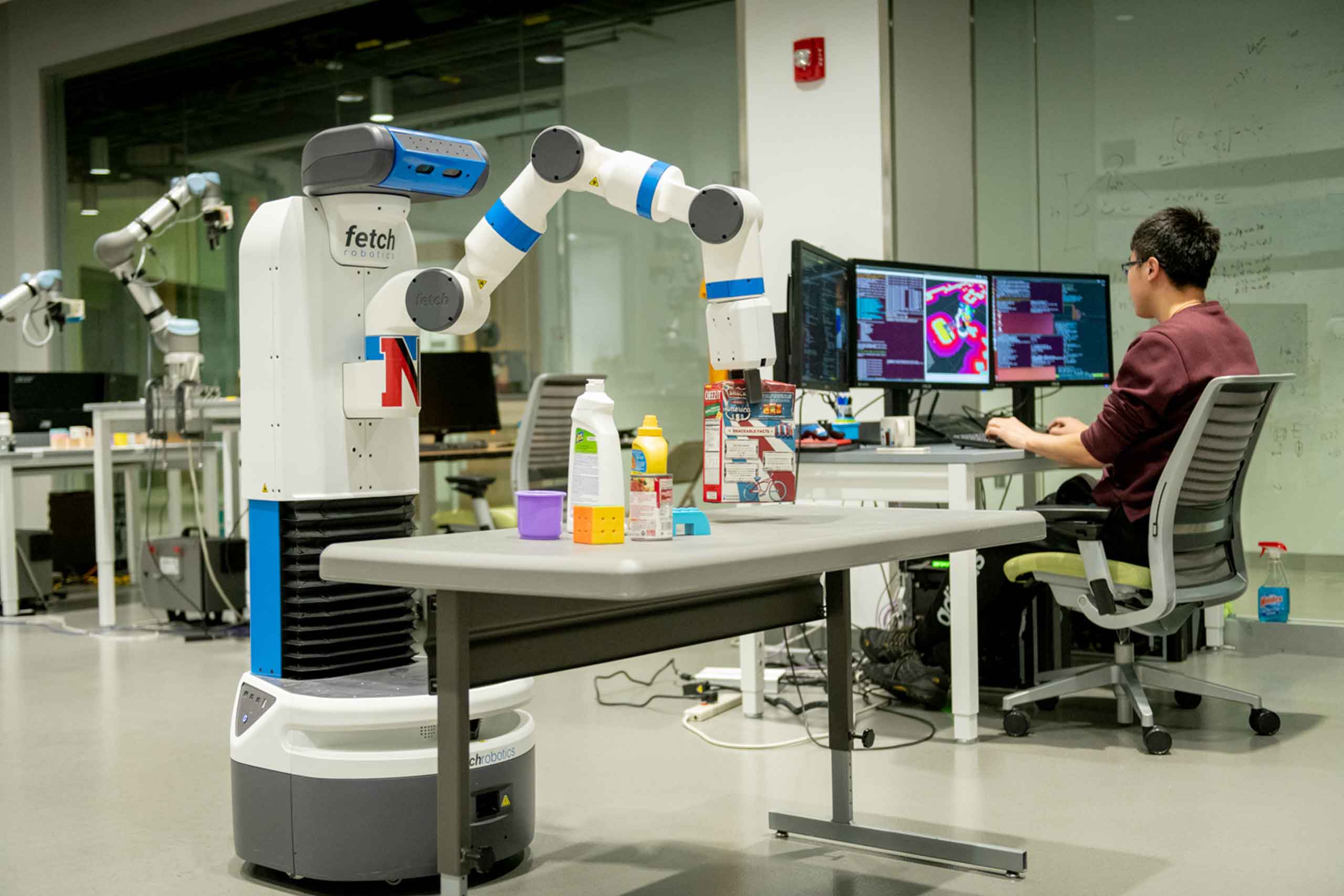





When Agnes Chan helped found the College of Computer Science (now Khoury College) in 1982, “cybersecurity” was not yet a word, much less a critical field within computer science. Through Chan’s leadership as Associate Dean of Graduate Programs and Associate Dean of Research from 1993 through 2015, and through her role as Executive Director of the cybersecurity programs, Northeastern has become a leader in cybersecurity and a top destination for students interested in this growing field.

Agnes Chan
Chan’s exploration into cybersecurity began with her interest in cryptography and its application to digital communication. She was the first at Khoury College to teach courses in cryptography and networking as part of the computer science curriculum. When the National Security Agency (NSA) noticed a severe shortage of people qualified to work in cybersecurity and began a program to recognize universities providing these skills, Chan saw an opportunity.
Although the school taught many of the computer science courses required for this program (known as the National Academic Centers of Excellence in Cybersecurity, or CAE-C), there were gaps. Through Chan’s leadership, the College enhanced its offerings, including adding a now-popular course in cyber law. Khoury College successfully received the CAE-C designation in 2001. Later, in 2008, the NSA introduced the Center of Academic Excellence in Cybersecurity Research (CAE-R) to recognize universities with strong cybersecurity research activities, and CAE-Cyber Operations in 2012 to certify programs with technical depth. Northeastern was one of the first to receive both designations, and one of only a few universities at that time to receive all three CAE designations.
“In 40 years, look at what we have achieved! We are among the top 20 programs in computer science. That takes a lot of effort.” — Agnes Chan
At the same time, Chan led the creation of the multidisciplinary Institute of Information Assurance (IIA) at the College in 2005. Bringing together faculty and students in the fields of computer science, electrical engineering, and social science and the humanities, the institute focuses on advancing research and education related to the integrity and security of information and reducing the likelihood of cyber-attacks.
In her time at Khoury, Chan has been dedicated to maintaining the school’s “vibrant graduate programs, emphasizing quality.” A key focus of her efforts has been supporting the needs of students from diverse backgrounds. She was instrumental in launching the Align program, a Master of Science in CS, designed for students with no formal background in the field.
Working with other graduate school deans at Northeastern, Chan also led an effort to create university-funded fellowships for qualified first-year PhD students who had financial need. This was critical for attracting a wide array of strong PhD applicants to the university, as well as to improving the school’s research rankings. As Chan says, “In 40 years, look at what we have achieved! We are among the top 20 programs in computer science. That takes a lot of effort.”
When Agnes Chan helped found the College of Computer Science (now Khoury College) in 1982, “cybersecurity” was not yet a word, much less a critical field within computer science. Through Chan’s leadership as Associate Dean of Graduate Programs and Associate Dean of Research from 1993 through 2015, and through her role as Executive Director of the cybersecurity programs, Northeastern has become a leader in cybersecurity and a top destination for students interested in this growing field.

Agnes Chan
Chan’s exploration into cybersecurity began with her interest in cryptography and its application to digital communication. She was the first at Khoury College to teach courses in cryptography and networking as part of the computer science curriculum. When the National Security Agency (NSA) noticed a severe shortage of people qualified to work in cybersecurity and began a program to recognize universities providing these skills, Chan saw an opportunity.
Although the school taught many of the computer science courses required for this program (known as the National Academic Centers of Excellence in Cybersecurity, or CAE-C), there were gaps. Through Chan’s leadership, the College enhanced its offerings, including adding a now-popular course in cyber law. Khoury College successfully received the CAE-C designation in 2001. Later, in 2008, the NSA introduced the Center of Academic Excellence in Cybersecurity Research (CAE-R) to recognize universities with strong cybersecurity research activities, and CAE-Cyber Operations in 2012 to certify programs with technical depth. Northeastern was one of the first to receive both designations, and one of only a few universities at that time to receive all three CAE designations.
“In 40 years, look at what we have achieved! We are among the top 20 programs in computer science. That takes a lot of effort.” — Agnes Chan
At the same time, Chan led the creation of the multidisciplinary Institute of Information Assurance (IIA) at the College in 2005. Bringing together faculty and students in the fields of computer science, electrical engineering, and social science and the humanities, the institute focuses on advancing research and education related to the integrity and security of information and reducing the likelihood of cyber-attacks.
In her time at Khoury, Chan has been dedicated to maintaining the school’s “vibrant graduate programs, emphasizing quality.” A key focus of her efforts has been supporting the needs of students from diverse backgrounds. She was instrumental in launching the Align program, a Master of Science in CS, designed for students with no formal background in the field.
Working with other graduate school deans at Northeastern, Chan also led an effort to create university-funded fellowships for qualified first-year PhD students who had financial need. This was critical for attracting a wide array of strong PhD applicants to the university, as well as to improving the school’s research rankings. As Chan says, “In 40 years, look at what we have achieved! We are among the top 20 programs in computer science. That takes a lot of effort.”











